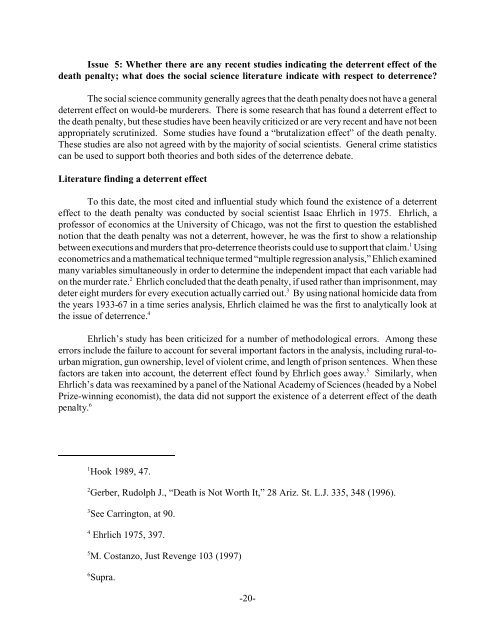report of the kansas judicial council death penalty advisory
report of the kansas judicial council death penalty advisory
report of the kansas judicial council death penalty advisory
You also want an ePaper? Increase the reach of your titles
YUMPU automatically turns print PDFs into web optimized ePapers that Google loves.
Issue 5: Whe<strong>the</strong>r <strong>the</strong>re are any recent studies indicating <strong>the</strong> deterrent effect <strong>of</strong> <strong>the</strong><br />
<strong>death</strong> <strong>penalty</strong>; what does <strong>the</strong> social science literature indicate with respect to deterrence?<br />
The social science community generally agrees that <strong>the</strong> <strong>death</strong> <strong>penalty</strong> does not have a general<br />
deterrent effect on would-be murderers. There is some research that has found a deterrent effect to<br />
<strong>the</strong> <strong>death</strong> <strong>penalty</strong>, but <strong>the</strong>se studies have been heavily criticized or are very recent and have not been<br />
appropriately scrutinized. Some studies have found a “brutalization effect” <strong>of</strong> <strong>the</strong> <strong>death</strong> <strong>penalty</strong>.<br />
These studies are also not agreed with by <strong>the</strong> majority <strong>of</strong> social scientists. General crime statistics<br />
can be used to support both <strong>the</strong>ories and both sides <strong>of</strong> <strong>the</strong> deterrence debate.<br />
Literature finding a deterrent effect<br />
To this date, <strong>the</strong> most cited and influential study which found <strong>the</strong> existence <strong>of</strong> a deterrent<br />
effect to <strong>the</strong> <strong>death</strong> <strong>penalty</strong> was conducted by social scientist Isaac Ehrlich in 1975. Ehrlich, a<br />
pr<strong>of</strong>essor <strong>of</strong> economics at <strong>the</strong> University <strong>of</strong> Chicago, was not <strong>the</strong> first to question <strong>the</strong> established<br />
notion that <strong>the</strong> <strong>death</strong> <strong>penalty</strong> was not a deterrent, however, he was <strong>the</strong> first to show a relationship<br />
between executions and murders that pro-deterrence <strong>the</strong>orists could use to support that claim. 1 Using<br />
econometrics and a ma<strong>the</strong>matical technique termed “multiple regression analysis,” Ehlich examined<br />
many variables simultaneously in order to determine <strong>the</strong> independent impact that each variable had<br />
on <strong>the</strong> murder rate. 2 Ehrlich concluded that <strong>the</strong> <strong>death</strong> <strong>penalty</strong>, if used ra<strong>the</strong>r than imprisonment, may<br />
deter eight murders for every execution actually carried out. 3 By using national homicide data from<br />
<strong>the</strong> years 1933-67 in a time series analysis, Ehrlich claimed he was <strong>the</strong> first to analytically look at<br />
<strong>the</strong> issue <strong>of</strong> deterrence. 4<br />
Ehrlich’s study has been criticized for a number <strong>of</strong> methodological errors. Among <strong>the</strong>se<br />
errors include <strong>the</strong> failure to account for several important factors in <strong>the</strong> analysis, including rural-tourban<br />
migration, gun ownership, level <strong>of</strong> violent crime, and length <strong>of</strong> prison sentences. When <strong>the</strong>se<br />
factors are taken into account, <strong>the</strong> deterrent effect found by Ehrlich goes away. 5 Similarly, when<br />
Ehrlich’s data was reexamined by a panel <strong>of</strong> <strong>the</strong> National Academy <strong>of</strong> Sciences (headed by a Nobel<br />
Prize-winning economist), <strong>the</strong> data did not support <strong>the</strong> existence <strong>of</strong> a deterrent effect <strong>of</strong> <strong>the</strong> <strong>death</strong><br />
<strong>penalty</strong>. 6<br />
1<br />
Hook 1989, 47.<br />
2<br />
Gerber, Rudolph J., “Death is Not Worth It,” 28 Ariz. St. L.J. 335, 348 (1996).<br />
3<br />
See Carrington, at 90.<br />
4<br />
Ehrlich 1975, 397.<br />
5<br />
M. Costanzo, Just Revenge 103 (1997)<br />
6<br />
Supra.<br />
-20-

















